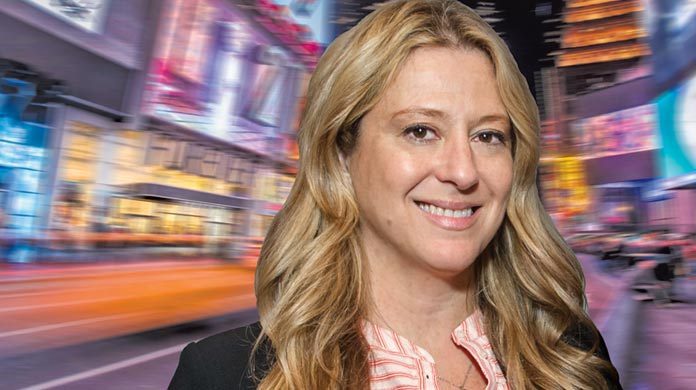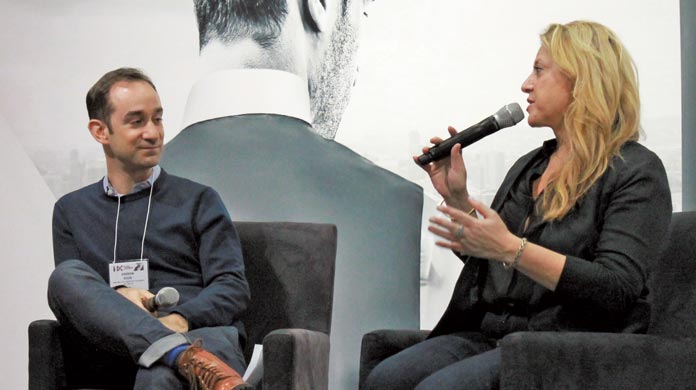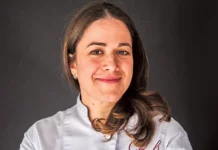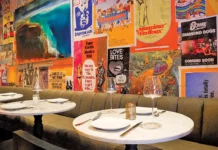
Ariel Palitz’s eyes lit up when she saw the job posting in 2017 for New York City’s new position of Nightlife Mayor.
The self-described “nocturnal” dynamo has taken the City by storm as she has created and guides the Office of Nightlife.
As a former nightclub and bar owner, she brings a truly unique perspective to her position.
From town hall meetings in each of the boroughs to seminars at Javits trade shows, Ariel Palitz has worked non-stop to support the needs of the City’s nightlife operator and at the same time, worked closely with the communities that they call home.
Total Food Service was able to catch up with Ariel Palitz and get an inside look at her vision for 2019 and beyond.
How did you get into the nightclub and bar business?
I got into the nightclub club and bar business because I was born and raised in Manhattan. When you grow up in New York slumber parties as a kid become a bar and nightlife because there isn’t really much to do in between.
My friends and me really grew up in the nightlife because it gave us a fun place to hang out in. I was really drawn to it with my love of music and dancing.
When I went to the University of Hartford, nightlife gave me a comfort zone.
I loved the diversity and ended up becoming a public relations spokesperson for a group called Minds Over Matter and as part of that I created a weekly open mic jam session called the solution session with the house band and I did it for about two years on campus.
When I came back to Manhattan, I found that a lot of my friends were now actually running bars and clubs. They invited me to do my open mike jam session for five years.
Before I knew it, I was promoting and doing events at nightspots like Tunnel and Limelight. There was great live music and deejays. It was a common ground for diverse expression where we had hip-hop, gospel and soul all under the same roof.
It’s funny, while many were moonlighting, I was day lighting. I was Larry Gold’s assistant. I worked at Mick Mac records I worked at Susan Blond public relations so I had a lot of different day hospitality jobs to support my nighttime promotions.
What led you from promoting to ownership?
In 2003 I became an investor in a bar called The Flat on First. A year later that business wasn’t doing well and the owners were bailing out.
I took it over, renamed it and relaunched as Sutra Lounge and ended up owning that venue in the East Village for ten years.
What led you to where we are today as the city’s first nightlife Mayor?
So as I was running the club for 10 years I was also on the local Community Board 3. It thrust me into a more political position because my bar was the recipient of a lot of 311 complaint calls from a chronic caller.
So I felt it was really important for me to get involved to make sure that there was a fair way of determining good and bad operators versus good and bad neighbors.
There’s no question that being one of the only liquor license holders serving on the Community Board for six years exposed me to an operator’s responsibility.
Most importantly, it gave me an understanding of the impact of nightlife on a community and how to create solutions that benefit all parties.
After I sold my bar in 2014, I also withdrew from the community board. I took a year off to recover and refocus.
I then started a consulting company with integrated Commercial Real Estate Services.
The goal was to help people open bars and restaurants and help get through the process required to acquire a liquor license and of course to assist them in understanding the in’s and out’s of working with a local Community Board.
So how did the move from consulting to the Nightlife mayor come to pass?
I was running a successful practice for about two and a half years. Someone showed me the job description for the Nightlife Mayor position and I knew right away that it was basically the story of my life and fit me to a tee.
So I applied and was thrilled to get the opportunity.
So as you get ready to celebrate your first year on the job, how have you adjusted to politics?
I just really never saw myself in politics although pretty much everyone around me did. I’ve always been a fierce advocate. I was affectionately called The Mayor of First and First having lived there for 25 years.
My club was at that location and I lived upstairs. Now that I’m here it’s a dream job. You know I’ve never even really worked for anyone else.
It’s an incredible use of my experience, skills, connections and my passion and purpose. It really gives me an opportunity to be of help and to make change where there really needs to be.
I have found a lot of support and cooperation from the city and all the city agencies in the community.
I have a great team and things have really been falling into place because there was clearly a need to support an industry that means so much to the City.
This month, you will host the final stop on your five borough Town Hall meeting tour. What are your goals for that program?
Let’s work with this set of assumptions. We all know how important nightlife is to New York. It’s crucial to the City’s economy, culture and identity.
We also know that because of its intensity and vibrancy that it has implications in each borough and community. So the tour has enabled me to validate many of these assumptions.
The benefit of having a listening tour is that each story I hear brings clarity of the bigger picture. More than anything I’ve really been happy to hear people’s creative ideas and solutions on how we can best proceed.
We have all known what the challenges are for a long time. The tour enables us to move on from defining the problems to addressing them in an efficient and meaningful way.
Can you take a minute and recap what some of the crucial common issues are that your borough tour attendees are focused on?
The issues and concerns run the gamut from noise issues to the coordination of City services.
Many operators and communities are concerned with not having enough creative spaces for our culture to thrive, how to determine DIY (Do it Yourself) spaces and legitimizing underground quasi-legal spaces.
The perspective I am focused on is that this is a 24-hour city and all the issues that we might anticipate during the day also happen at night too.
So it is a microcosm of society as a whole. We’re dealing with social justice issues everything you could imagine. And so it’s really a question of taking this information prioritizing and making sure that we have realistic expectations.
Obviously in order to get any of this done on your agenda it requires the coordination of the mayor’s office. Have you gotten that type of response and coordination and cooperation from them that you were looking for?
We are still in the very early stages and we have yet to put together our proposals and recommendations.
In the interim we have nothing but support. Everyone’s very accessible very supportive and enthusiastic to make this work.
As you look at the City obviously the nightlife tends to be Manhattan centric. We also have a vibrant food scene in Brooklyn and the potential impact of the recent Amazon announcement to move to Long Island City. So how do you balance your agenda?
In one respect there are universal issues. It is important that what happens and the lessons learned in Manhattan are implemented in the other boroughs as their nighttime economies continue to grow.
We also need to understand that each borough has its own unique identity and issues to be considered.

How can a Nightlife operator connect with your office?
The Office of nightlife in and of itself is not a reporting office or a 311 or 911 service. What we are hoping to be is a liaison for all of the existing services.
We are working on the creation of our website: nightlife’s website that will connect all of the dots to all the agencies and programs and services throughout the city that support nightlife.
We look for that to simplify the process of navigating through opening and operating. Our goal is to also have it serve the needs of artists, employees, patrons and residents.
We welcome recommendations or requests for assistance. In addition, if all else has failed and they feel like they need a little extra advocacy from the mayor’s office and from the administration there will be people to help.
What suggestions do you have for our readership in terms of how to interact and work with a local community something you did successfully for so long as an operator?
It all comes down to humanizing each other and having a relationship and communication with your neighbors. Why not reach out during the day and try to develop understanding and relationships that can be honored in the evening.
You will find that it is a great strategy to eliminate 311 or 911 or 3am calls to the Community Board. It’s all about mutual respect for each other that has been lacking.
One of the things we’ll be doing is also making free mediation services available.
I know you’re not in the business of giving advice but you were a very successful operator for a long time. What are some of the keys that you see with successful nightlife operators?
It starts with a unique and creative vision. You have to have your own sense of self as an operator and not just duplicate other people’s business models.
New Yorkers love something that’s different and fresh. They have high standards and expectations in service, food, lighting and music. You also have to be committed to being there in person because it’s a lifestyle not a job.
Customers need to know who’s running the business and by treating your employees properly, they then bring that same good feeling to your customers’ experience.
Pay attention to detail and just run a quality place and that is what New Yorkers love more than anything is quality. Finally, don’t let it get stale.
You’re going to be on the cover of our top women in food service issue. Where do you think we are in terms of glass ceiling and the City presenting opportunity for women to succeed in our industry?
We’re doing a great job. For the most part, women really run New York. Obviously nightlife and hospitality in most industries has been a man’s game.
Women really are our shining stars and running the show with incredible creativity. I admire any woman running the show in New York. People would constantly comment that it must be so hard running a nightclub in New York.
I would always answer no. It’s actually easier because it’s easier to achieve when you’re being underestimated.
Last month, the sale of legalized recreational marijuana came to Massachusetts. Connecticut and New Jersey are both giving it serious consideration. What are your thoughts on how it could impact the nightlife of New York, if and when it is legalized?
I can’t speak for the administration but it feels, as though from a national and global perspective that recreational marijuana is inevitable. When the time comes we will address it accordingly.
I think you know even with legal alcohol there are boundaries in order to make sure that it’s regulated so that you can’t drink beer on the street.
You don’t drive while drinking so I would imagine it would be along those lines. Since there are other cities and countries that have already done this there are probably some guidelines we can refer to from other cities.
As we prepare for 2019, what’s at the top of your agenda?
I just want to make it easier for business owners to operate. I want to help create and maintain space for the creative community to flourish.
And I want to make it a more pleasant experience for people to live here so that we can all coexist together.
To learn more about Ariel Palitz and the New York City Office of Nightlife, visit Nightlife website.























